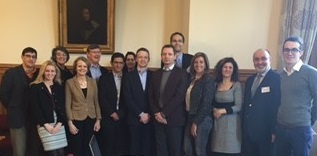Academic workshop on best practices in the field of electronic registry design and operations
Associated people
An academic workshop was held at Harris Manchester College on 30 and 31 March 2016, as part of the e-registry project run jointly by the Commercial Law Centre at Harris Manchester College and the UNIDROIT Foundation. This purpose of this project is to develop a framework to establish and evaluate best practices in electronic registration, both as a guide to registrars and those involved in such registration and, if appropriate, as part of the process of establishing liability for loss caused by malfunction of registers. Electronic registries have emerged as a main element of systems in many contexts (including commercial contexts) that collect, store, disseminate and establish rights in data or property represented by that data. Establishing best practices for their use and protection is, therefore, of major commercial importance.

The Cape Town Convention on International Interests in Mobile Equipment provides for an international registry to be set up in relation to each of its protocols: at present there is a registry in Dublin for interests in aircraft objects and a registry is being established in Luxembourg for rail objects. These are important examples of international electronic registries. The Convention sets out a standard for the responsibility of registrars for losses resulting from a ‘malfunction’ caused by ‘inevitable and irresistible’ events, which provides a defence where ‘best practices in current use’ in the field of electronic registry design and operation, including those related to back-up, systems security and networking, have been followed. However, ‘best practices in current use’ in electronic registries is not defined by the Convention, nor have international parameters been set forth. The project takes the Cape Town Convention standard as a starting point and example, to aid in the development of a wider framework.
The academic workshop was addressed to leading industry experts, academics and registrars and was chaired by Professor Jeffrey Wool (University of Washington). It included many interesting debates, drawing on the experience of practitioners, registrars and academics. It was clear that, although there are many industry standards applicable to various aspects of electronic registration, a matrix is necessary to decide, in relation to any given registry, which standards apply to which functions, and how those standards should be customised. It emerged from the discussion that two very important elements of the framework were the functions to be performed by the registry, and the evaluation of the risks in relation to each function.
Ultimately, the workshop's discussions made a significant contribution towards the development of this functional risk-based approach, and the next steps will be to refine and elaborate the functional risk-based approach in order to test it in relation different types of commercial registries, for example, registries of secured transactions and registries of companies.


